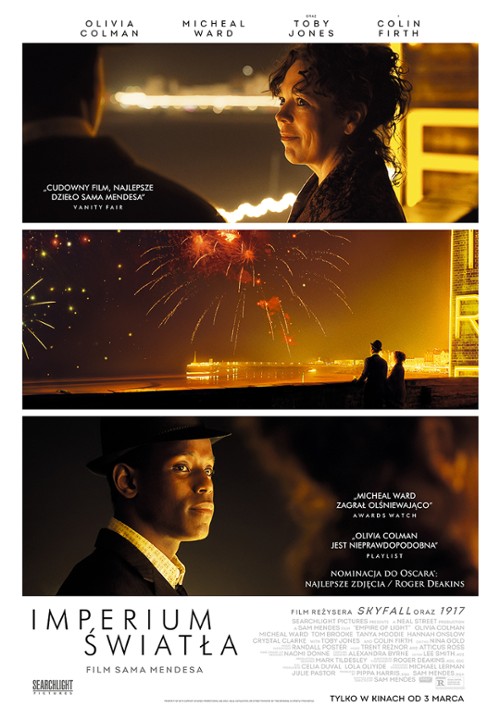Forgive the sarcasm, but even a little Toto from Tornatore shouldn’t reproduce indefinitely. Sam Mendes’ “Empire of Light” is another author’s compromise with youth and at the same time a love testament to the tenth muse. If you’ve already looked at the rating, I understand the confusion. The director’s subtlety, the skill of the staging, and the acting ceremony do not allow me to sneer until I drop dead. However, what separates the movie from the greatness is the nostalgia, which is hard to digest and softens all the raw textures of the memories. Can’t you have it all?
Recently, Steven Spielberg’s fantastic “Fabelmans” proved he could. Suffice it to suggest that motion picture art is inherently paradoxical. For the creator of Jaws, cinema is at once a causative and disorienting force, life-giving and destructive; It is sand, textiles, and fireworks from which something metaphysical is conjured; Technology is in service of the scene, but also the promise of a kind of epiphany. Mendes is more straightforward, you can actually see it in the title – that is, no more, no less, a movie projector. “Theoretically, light consists only of carbon, cathode and sparks. But nothing happens without light” – we hear from the screen. Someone stop these waterfalls of tears.
Set in the 1980s, we are on the northern seafront of Kent. Hilary (Olivia Colman) is buzzing about the only movie theater in the area. The director features her in a few great dedicated vignettes. The woman suffers from bipolar disorder, takes lithium, has an affair with her married boss (Colin Firth), and stays away from the movies as a ritual (don’t worry, it’ll change). The routine of her coming days is the frame of the entire story, and lonely love Stephen (Michelle Ward) would prove to be a wedge driven into the seamless fabric of her existence and the narrative fabric of the film. Jumping sparks will create a slightly different light here, and in it the heroes will warm themselves. In the background, of course, the projector rattles – soon Hugh Hudson himself will appear in the humble shrine and present his famous “Chariots of Fire” at the premiere. As you can easily imagine, it will be a catalyst for bumps in the lives of the heroes. Nihil novi sub single.
The real premiere of Chariots of Fire took place at the Odeon in London’s Haymarket, but I love this kind of rewriting of history – after all, the screening of this film was a pivotal point in the life of the director himself. The pastel colors, subtle smoky, and economical camera by Roger Dickens create an atmosphere bordering on social realism and melodrama, which is theoretically meant to act as a sort of contrast to nostalgia. This, of course, works sporadically, particularly when Mendes shifts into sixth gear and we see a triple crescendo onscreen: anti-racist tensions come to a head, the heroine’s illness enters a critical juncture, and her relationship with Steven turns out to be one with no future. The script is overhauled by the sweat of the terrific cast, lowering tones where necessary and bringing nuance to their characters. Olivia Colman is brilliant as a woman on the verge of imploding. Tossed between conflicting instincts. Ward is also excellent, finding plenty of indifference in the “magical young man” Naphthalene’s character. In the background are Colin Firth and Toby Jones, who – respectively – will play the spunky little lady and well-meaning introverted fellow, who gets up in the middle of the night.
What’s not here: forbidden love and persecution of minorities, mental and romantic illnesses, plus, of course, big C cinema — reduced to a series of aesthetic cliches, run by host angels, that are the only escape from everyday lunch. But even though there are way too many mushrooms floating in this borscht, you can watch Empire of Light wrapped in a blanket of nostalgia without a toothache. Mendes has the ability to extract elusive poetry from the greatest cliches, an eye for intriguing metaphors, and a hand for actors. I had a great time at Cinema Paradiso. Perhaps because it is not possible to discuss the needs of someone’s heart. Or maybe it’s because I love movies too.

“Amateur social media maven. Pop cultureaholic. Troublemaker. Internet evangelist. Typical bacon ninja. Communicator. Zombie aficionado.”





![Venice Film Festival 2022. Awards Ceremony [RELACJA NA ŻYWO] Venice Film Festival 2022. Awards Ceremony [RELACJA NA ŻYWO]](https://www.moviesonline.ca/wp-content/uploads/2022/09/Venice-Film-Festival-2022-Awards-Ceremony-RELACJA-NA-ZYWO.jpeg)




